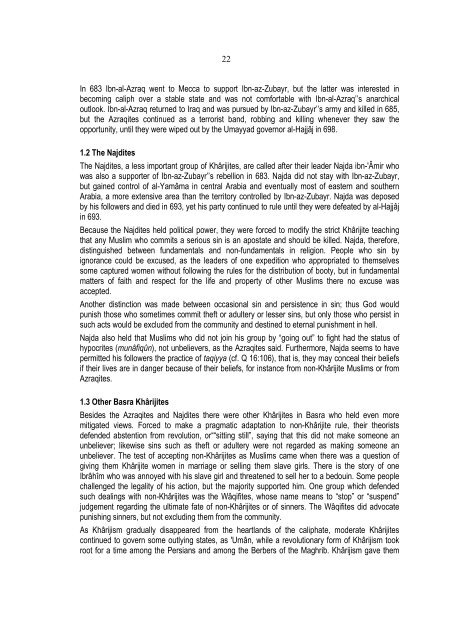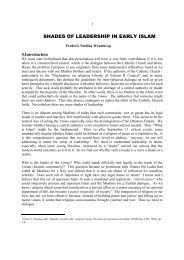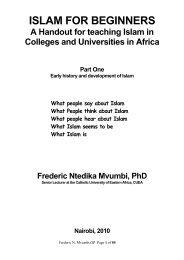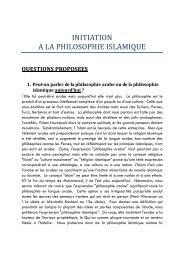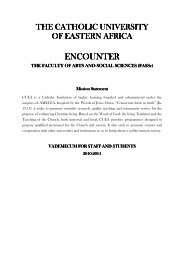INTRODUCTION TO ISLAMIC THEOLOGY.pdf - CUEA
INTRODUCTION TO ISLAMIC THEOLOGY.pdf - CUEA
INTRODUCTION TO ISLAMIC THEOLOGY.pdf - CUEA
Create successful ePaper yourself
Turn your PDF publications into a flip-book with our unique Google optimized e-Paper software.
22In 683 Ibn-al-Azraq went to Mecca to support Ibn-az-Zubayr, but the latter was interested inbecoming caliph over a stable state and was not comfortable with Ibn-al-Azraq’’s anarchicaloutlook. Ibn-al-Azraq returned to Iraq and was pursued by Ibn-az-Zubayr’’s army and killed in 685,but the Azraqites continued as a terrorist band, robbing and killing whenever they saw theopportunity, until they were wiped out by the Umayyad governor al-Hajjâj in 698.1.2 The NajditesThe Najdites, a less important group of Khârijites, are called after their leader Najda ibn-'Âmir whowas also a supporter of Ibn-az-Zubayr’’s rebellion in 683. Najda did not stay with Ibn-az-Zubayr,but gained control of al-Yamâma in central Arabia and eventually most of eastern and southernArabia, a more extensive area than the territory controlled by Ibn-az-Zubayr. Najda was deposedby his followers and died in 693, yet his party continued to rule until they were defeated by al-Hajjâjin 693.Because the Najdites held political power, they were forced to modify the strict Khârijite teachingthat any Muslim who commits a serious sin is an apostate and should be killed. Najda, therefore,distinguished between fundamentals and non-fundamentals in religion. People who sin byignorance could be excused, as the leaders of one expedition who appropriated to themselvessome captured women without following the rules for the distribution of booty, but in fundamentalmatters of faith and respect for the life and property of other Muslims there no excuse wasaccepted.Another distinction was made between occasional sin and persistence in sin; thus God wouldpunish those who sometimes commit theft or adultery or lesser sins, but only those who persist insuch acts would be excluded from the community and destined to eternal punishment in hell.Najda also held that Muslims who did not join his group by “going out” to fight had the status ofhypocrites (munâfiqûn), not unbelievers, as the Azraqites said. Furthermore, Najda seems to havepermitted his followers the practice of taqiyya (cf. Q 16:106), that is, they may conceal their beliefsif their lives are in danger because of their beliefs, for instance from non-Khârijite Muslims or fromAzraqites.1.3 Other Basra KhârijitesBesides the Azraqites and Najdites there were other Khârijites in Basra who held even moremitigated views. Forced to make a pragmatic adaptation to non-Khârijite rule, their theoristsdefended abstention from revolution, or““sitting still”, saying that this did not make someone anunbeliever; likewise sins such as theft or adultery were not regarded as making someone anunbeliever. The test of accepting non-Khârijites as Muslims came when there was a question ofgiving them Khârijite women in marriage or selling them slave girls. There is the story of oneIbrâhîm who was annoyed with his slave girl and threatened to sell her to a bedouin. Some peoplechallenged the legality of his action, but the majority supported him. One group which defendedsuch dealings with non-Khârijites was the Wâqifites, whose name means to “stop” or “suspend”judgement regarding the ultimate fate of non-Khârijites or of sinners. The Wâqifites did advocatepunishing sinners, but not excluding them from the community.As Khârijism gradually disappeared from the heartlands of the caliphate, moderate Khârijitescontinued to govern some outlying states, as 'Umân, while a revolutionary form of Khârijism tookroot for a time among the Persians and among the Berbers of the Maghrib. Khârijism gave them


